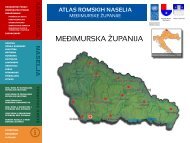You also want an ePaper? Increase the reach of your titles
YUMPU automatically turns print PDFs into web optimized ePapers that Google loves.
The activity gathered Alessandro Portinaro (Turin), Jordi Tolrà (Barcelona) Hassan Acanal<br />
(Istanbul) and Mattia Sifredi (Marseille), moderate and presented by Bruno Héraud-Giraud, president<br />
of the CICM (Le Conservatoire International des Cuisines Méditerranéennes).<br />
Alessandro Portinaro highlighted, among<br />
other questions, the importance that the<br />
local markets broaden the number of foods for sale<br />
produced in the proximity, for contributing in this<br />
way to the alimentary sovereignty and to the sustainability.<br />
The Conservatoria Del Piermonte and<br />
the Town Council of Turin are promoting this trend<br />
in the theirs markets and especially with the Torino<br />
Food Market Festival that is celebrated annually.<br />
Jordi Tolrà explained the Barcelona model<br />
of modernization of the markets, a real success<br />
programme thanks to joint efforts of both the<br />
administration and the traders. Barcelona has modernized<br />
and has remodeled in the last 15 years a total<br />
of 16 of the city’s covered markets (market halls).<br />
Mattia Sifredi, of the ADEAR 13 (Association<br />
de Développement de l’Emploi<br />
Agricole et Rural) of Marseille, he pointed out the<br />
importance of introducing in the market mix a larger<br />
number of biological products and food produced in<br />
the proximity, as a way to stimulate the local agriculture.<br />
The ADEAR has managed to create a total of 5<br />
farmer markets in the last 10 years in the Department<br />
13 (Bouches du Rhône)<br />
Hasan Acanal, representing of the Egyptian<br />
Market (Misr Bazar) of Istanbul, better<br />
known as a Market of the Spices, explained how this<br />
market creates neighbourhood ties and how the trade<br />
stimulates all the zone. He also introduced the different<br />
typology of markets in Turkey, the origins of<br />
which are very antique even though they take the current<br />
form in the Ottoman period.<br />
http://www.medemporion.eu/index.php/contents/details/are-the-mediterranean-markets-a-good-model-for-the-european-union<br />
MARKETS,<br />
TOWARDS THE FUTURE<br />
Food markets are an institution in Europe<br />
and have existed for centuries. Europe’s history<br />
is built upon the history of its markets and its great<br />
traders, who traveled all over the continent exchanging<br />
their products. The sea played a key role in trade development,<br />
especially the Mediterranean. Sailors traveled<br />
through a web of routes of unlimited scope, principally<br />
for trading, but these trips also spread new ideas and<br />
inventions.<br />
According to historians, Phoenicians reached<br />
Cornwall in Great Britain, where they<br />
bought tin and exchanged products. Ancient Greeks<br />
travelled all over Europe trading a wide range of food<br />
products. Roman merchants hired huge vessels to carry<br />
their valuable freight of wine, olive oil and grains. Many<br />
cities were built up around their central markets during<br />
the Middle Ages. Markets have at all times been a key<br />
piece in the building of cities and also in the European<br />
building process.<br />
new Europe is being built. Its social model<br />
A and foundation are currently being defined.<br />
The vast experience of the EMPORION markets has<br />
shown that investing in markets means investing in cities<br />
and citizen’s the quality of life. Thus EMPORION<br />
seeks to promote markets as a crucial, essential tool in<br />
the Europe building project.<br />
Public food markets are the best place to start<br />
in order to promote public health by means<br />
of adequate nutrition. As thriving social and commerce<br />
centers, markets also contribute to a vibrant cityscape,<br />
and promote contact between citizens. Markets are<br />
closer and to the people than the shopping superstores<br />
sales model, which add little to the liveliness or unique<br />
character of city centers, and build stores on the outskirts.<br />
M<br />
arkets such as Porta Palazzo in Turin,<br />
Központi Vásárcsarnok in Budapest, Borough<br />
Market in London, the Markets of Lyon and La<br />
Boqueria Market in Barcelona are good examples of<br />
what markets can do for those cities that believe in improving<br />
themselves and their citizens’ quality of life.<br />
market<br />
WORLD OF MARKETS<br />
Source<br />
ISSUE II 19






